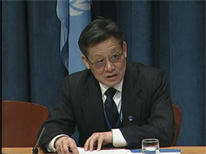
When Secretary-General Ban Ki-moon addressed the special high-level meeting on financing for development last month, he urged that the course charted for should be truly sustainable, equitable development. “The world is still reeling from the financial and economic crisis. The path to recovery has been slow, fragile and uneven. Rising debt levels, growing inequality and social exclusion are real concerns,” he stated.
Indeed, a lot has happened since the first UN International Conference on Financing for Development that took place in Monterrey, Mexico in March 2002. The conference resulted in the Monterrey Consensus, embracing main areas for financing for development including mobilizing domestic and international financial resources; international trade; increasing international financial and technical cooperation; external debt and addressing issues to enhance the coherence of the international monetary, financial and trading systems.
At the Doha Conference in Qatar in 2008, heads of state and government and high representatives reaffirmed their commitment to the Monterrey Consensus resulting in the Doha Declaration. They declared that “we once again commit ourselves to eradicate poverty, achieve sustainable development as we advance to a fully inclusive and equitable global economic system.”
In the Doha Declaration, the countries also recognized that “mobilizing financial resources for development and the effective use of all those resources are central to the global partnership for sustainable development, including the Millennium Development Goals (MDGs).”
Remaining challenges and solutions discussed
On 10-11 March of this year, the special high-level meeting of the Economic and Social Council (ECOSOC) with the Bretton Woods Institutions (BWIs), the World Trade Organization (WTO) and the UN Conference on Trade and Development (UNCTAD) addressed many of these issues including aid for trade, debt relief, the role of the UN system in global economic governance and new challenges in the wake of the global financial crisis.
The least developed countries were also considered and a number of policy proposals were presented to resolve the challenging issues at hand. In addition, matters facing middle-income countries were discussed and the Secretary-General stated accordingly, “it is the middle-income countries that, to date, have led the recovery. Their impressive performance follows decades of admirable efforts to diversify exports and gain higher market shares for high-technology goods.”
He continued, “Yet, despite notable reductions in poverty levels, many middle-income countries face rising inequality, the persistence of extreme poverty, and a lack of adequate social security systems. Further efforts are needed to improve safety nets and economic security.”
The Secretary-General also observed that while there have been advancements, many difficult challenges still remain. Success has been seen when it comes to reducing extreme poverty, improving school enrolment and child health, reducing child mortality and enhancing access to preventive care of a number of tropical diseases. However, progress on the MDGs has been uneven. There have been slow improvements towards reaching full and productive employment and decent work for all, in advancing gender equality and in improving maternal and reproductive health.
Regarding the global partnership for development, the reviews found major gaps in the delivery of international development cooperation commitments, including aid levels and effectiveness, conclusion of the Doha Round of multilateral trade negotiations, debt relief and resolution mechanisms.
Planning for the future
The global efforts within financing for development is an ongoing and continuous process and as the Secretary-General concluded in his statement to the special high-level ECOSOC meeting, “in a volatile and changing world, we must not disappoint the many millions of people who look to us, and our organization, for help and reassurance. Let us respond to the full spectrum of their aspirations – economic, social, environmental and democratic. Let us listen to their voices, today and tomorrow”.
For more information:
Financing for Development
The Special High-level meeting of ECOSOC
The Monterrey Consensus
The Doha Declaration

Achieving effective outcomes in public administration has become increasingly challenging. This is a result of the rise in demand for public goods and services following natural disasters caused by climate change and devastation due to conflict. Disasters and conflicts cause tremendous destruction to global economic, political and social infrastructures and negatively impact the living conditions of world populations.
National governments and international organizations face increased difficulties in achieving internationally agreed development goals, including the Millennium Development Goals (MDGs). This occurs when states’ capacities are weakened by degradation and when appropriate public policies are either inadequate or nonexistent. The challenges resulting from these disastrous circumstances are often overwhelming to the existing capacities of local governments, and when not addressed, they bring the inefficiencies of public institutions to light, thus threatening their legitimacy.
The Committee of Experts on Public Administration (CEPA) will focus on strategies for more results-oriented public governance to assist stakeholders world-wide in addressing post-disaster and post-conflict challenges. Among the topics for discussion will be how to encourage governments to place greater emphasis on the result potential of their economic and social policies. This will better prepare them towards accomplishing the imperative improvements to the quality of life for populations, in the aftermath of conflict and disaster, for all.
Improvements in the various quality of life indicators requires formulating, implementing and assessing more successful strategies and systems for the delivery of public goods and services. The Committee will also discuss how effective social protection policies could be implemented to minimize the socio-economic impacts of conflict and disaster. States could address the poverty and vulnerability of citizens by minimizing their exposure to risks through the provision of basic services in critical areas, such as education, health care, water, nutrition and shelter.
Committee of Experts on Public Administration
The Committee will meet this month (4-8 April 2011) for the tenth annual session of discussions. CEPA is comprised of twenty-four specialists in public administration from all world regions, who are currently working in academia, government or public service. The overall theme of the session will be: “Public governance for results to improve the quality of human life for all, by supporting the implementation of the internationally agreed development goals including the Millennium Development Goals.”
Professor Susan Woodward, Rapporteur of the ninth session of CEPA, noted: “Of particular importance to CEPA this year are the rising number of devastating natural disasters, particularly due to climate change, which have moved from rare emergencies to regular, repeated occurrences in vulnerable countries, and the need of their public administrations to find ways to anticipate, plan for, and manage on a recurring basis, for which regional and international mechanisms and funding will be essential.”
The Committee will first focus on existing conceptual and operational frameworks for governance, with due attention to implications of multi-stakeholder systems to achieving better governance. Next, they will address the needs of populations in post-conflict and post-disaster countries and other vulnerable people. The Committee will also examine and debate social protection policies and programmes designed to reduce the poverty and vulnerability of citizens.
What have we learned?
In one of the main discussion papers of the upcoming meeting, entitled “Public governance for results: State capacity for post-conflict and post-disaster reconstruction and social protection policies,” recognition is made of the increased pervasiveness and institutionalized nature of humanitarian interventions in the case of natural disasters and complex emergencies. Studies of international assistance have revealed an “aid-institutions paradox.” The paradox is based on the idea that aid undermines or destroys local institutions and capacity, rather than assists in building them.
Most of the policies, programmes and projects of external assistance dominate the governance process in post-conflict countries. The criteria and results of those programmes are defined by donors and external actors and are internationally imposed, rather than locally formulated and proposed. When this occurs, local actors are not engaged in these processes. They do not become familiarized with the principles of good public governance, specifically including: transparency, accountability and professional integrity of public service and citizen participation, which become lost from not being emphasized.
An important lesson to recognize is that donors and external actors must continue to work more closely with local actors in order to render assistance adapted to the specific local contexts. This will give ownership to local actors and foster a greater sense of responsibility for outcomes among them.
Progress to date
The Division for Public Administration and Development Management (DPADM) has included a new component to their flagship publication, the biennial “United Nations e-Government Survey”, to assess the provision of public information to promote awareness of environment preservation issues by governments.
DPADM has also produced several analytical papers including: “Enhancing public administration effectiveness in Africa through strengthening local leadership capacity”, “Strategies for attracting and retaining the best talent in the public service in Africa” and “Public administration in achieving the Millennium Development Goals.”
Progress has also been made in improving knowledge-sharing, training, advocacy, partnership-building and advisory assistance. In 2010, the United Nations Public Administration Network (UNPAN) served as the de facto global network and portal for public administration and governance. The UNPAN Online Training Centre is available to deliver capacity-building courses on public administration free of charge.
To address the issue of post-conflict and post-disaster countries, the Bureau for Crisis Prevention and Recovery of the United Nations Development Programme has now begun to specialize in the early recovery of countries, which encompasses post-disaster, post-conflict and conflict prevention.
Many strides have already been made to create improved public governance, including capacity building conferences, workshops and seminars in different parts of the world. These programmes and activities will be continued throughout 2011.
For more information: http://www.unpan.org/DPADM/CEPA/10thSession/tabid/1446/language/en-US/Default.aspx

“Rio+20 is humanity’s chance to commit to a transition to a green economy, to lift people out of poverty. We cannot wait another 20 years,” said Sha Zukang, Secretary-General of the 2012 UN Conference on Sustainable Development and Under-Secretary-General for Economic and Social Affairs, at a news conference in New York on 8 March, following a preparatory meeting for Rio+20.
Mr. Sha said he hopes Member States will be able to agree on a “green economy as a pathway to sustainable development” and come up with a “tool kit” for implementation of agreed principles. He has earlier cautioned: “If we continue on our current path, we will bequeath material and environmental poverty, not prosperity, to our children and grandchildren”.
Video: http://www.unmultimedia.org/tv/webcast/2011/03/press-conference-rio-2012.html
Press release: http://www.un.org/News/briefings/docs/2011/110308_Rio.doc.htm
Statement: http://www.un.org/en/development/desa/usg/statements/2nd-prepcom-rio2012.shtml
UN Conference on Sustainable Development: http://www.uncsd2012.org/rio20/



